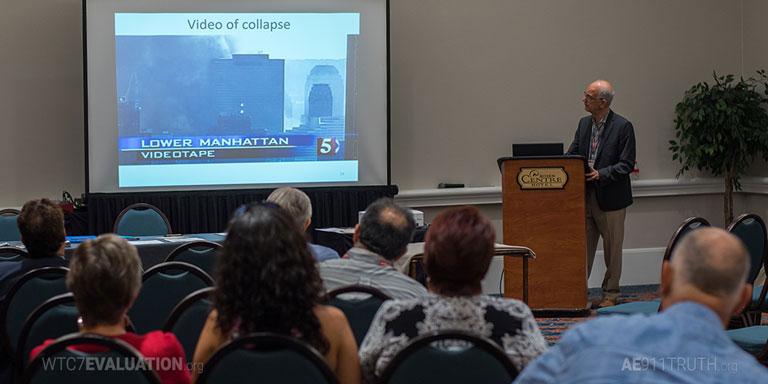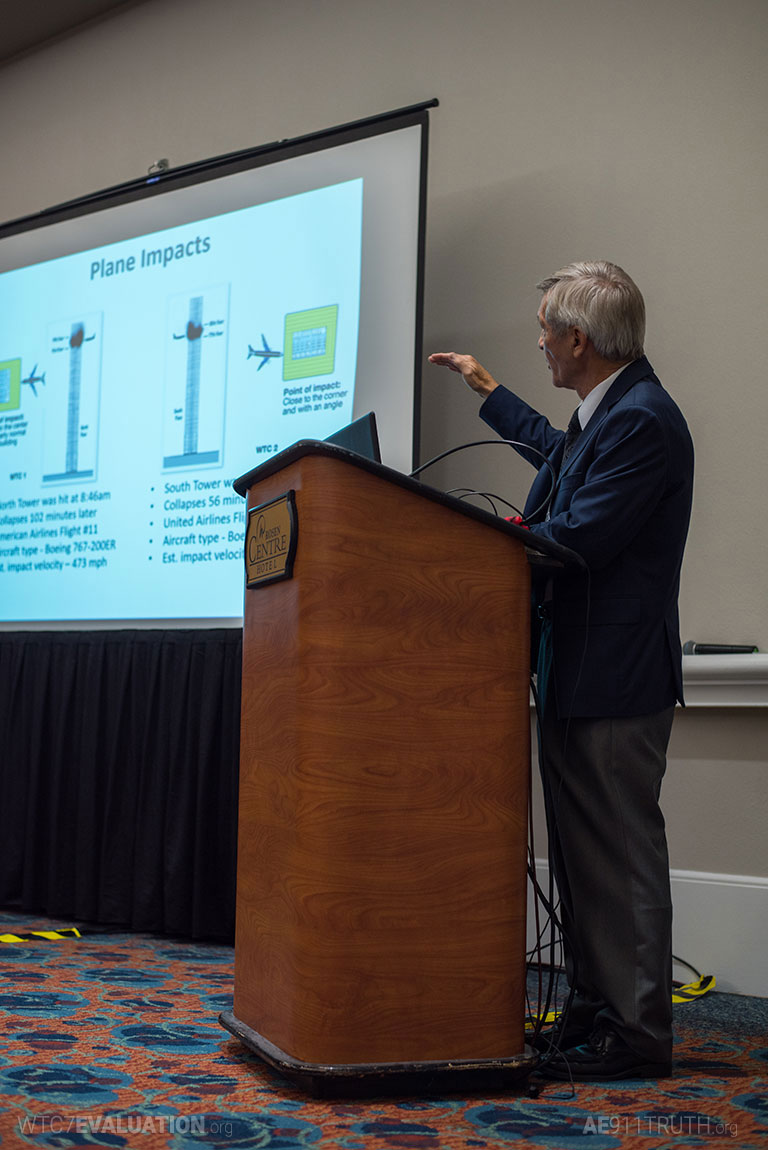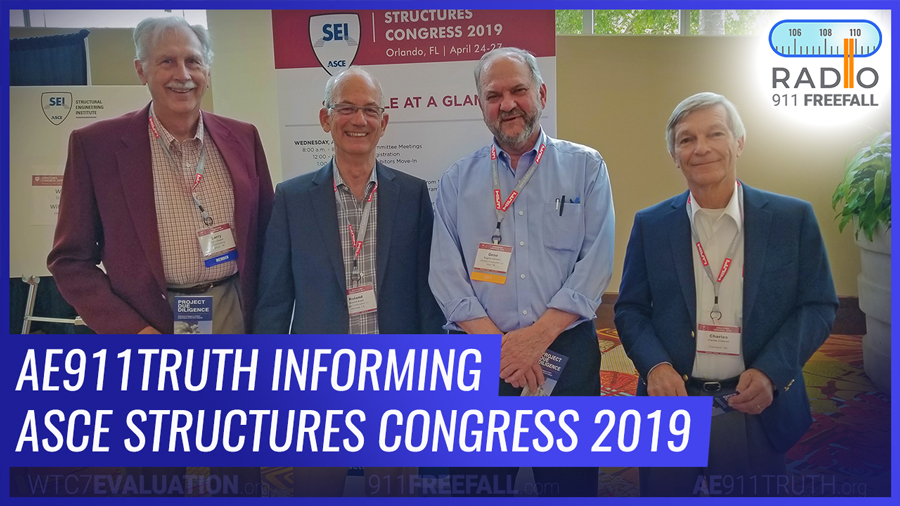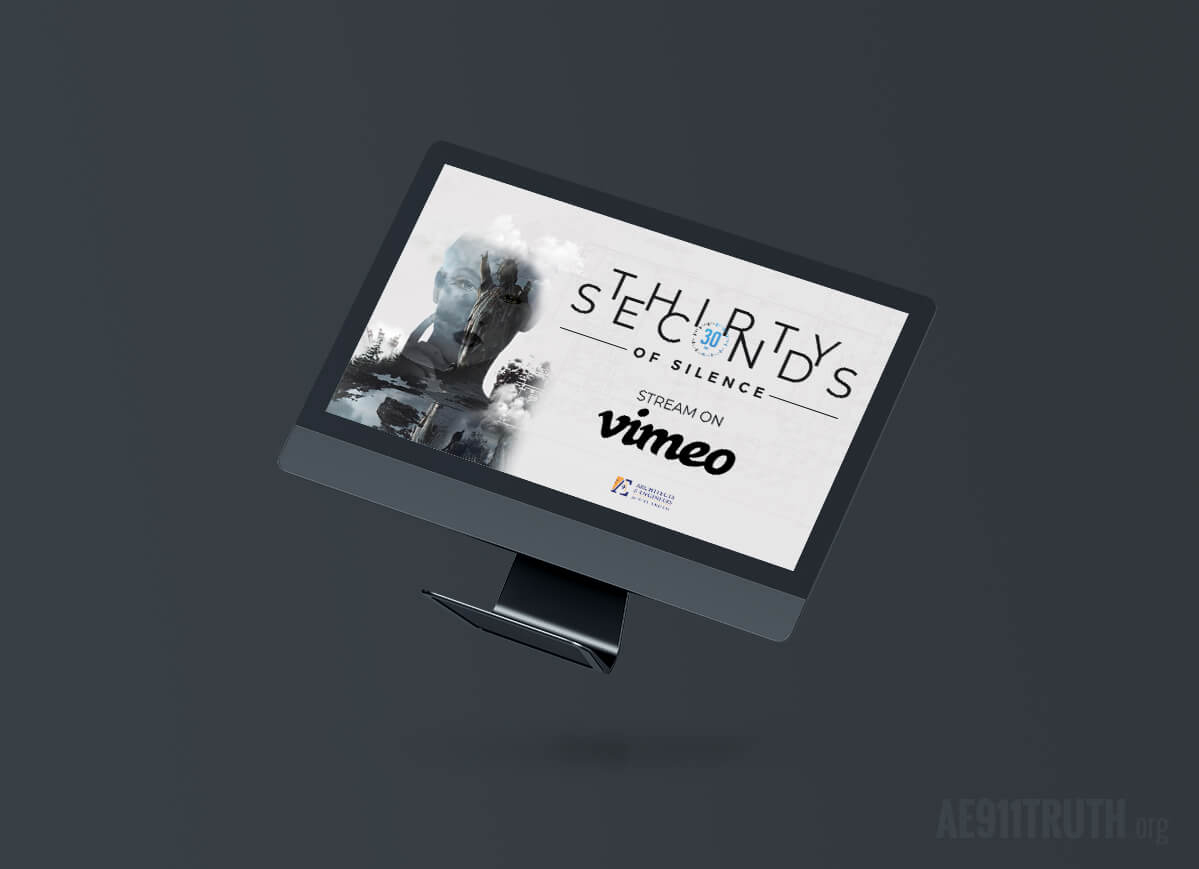On this week’s episode of 9/11 Free Fall, host Andy Steele is joined by civil engineer and AE911Truth board member Roland Angle to discuss his team's outreach, as part of Project Due Diligence, at the annual conference of the ASCE’s Structural Engineering Institute held in Orlando last week.
We invite you to listen on SoundCloud or YouTube, or to read the edited, condensed version of the interview below.
Andy: Tonight we’ll be talking with civil engineer and AE911Truth board member Roland Angle about his team’s outreach at the annual conference of the ASCE Structural Engineering Institute that happened in Orlando last week.
Roland, just keeping in mind that there may be people who are new to this whole issue and may not be very familiar with what the ASCE is and what goes on at these conferences, can you tell them first what the ASCE is and what the purpose of the conference overall was in Orlando?
Roland: The American Society of Civil Engineers is the oldest civil engineering association in the United States. It goes back to the mid-19th century. And they are the largest and most well-known of the engineering professional organizations. They have a number of sub-organizations that operate under the umbrella of the ASCE. One of them is the Structural Engineering Institute (SEI), which they founded in 1995, and that organization is focused on structural engineering. And the structural engineers who participate in that organization are involved in ongoing projects that are aimed at educating the structural engineering profession, keeping them up to date with latest developments, and providing a forum for them to meet and to confer and to network so that people can stay up to date and the best interests of the profession can be promoted.
One of the things that they do is they have yearly conferences. This was their yearly structural conference. It was held in Orlando from April 24th to the 27th. And about 1,100 engineers attended. They have exhibitions, different vendors and contractors that interact with the structural engineering profession. They have workshops on various aspects of the professional practice. They have leaders of the community speaking and giving inspiration and direction to the rank-and-file engineers who come in to see these conferences. And it’s similar to all the organizations — all professional organizations do this. This is one of the ones that is provided for structural engineers. There are other structural engineering associations. This one is associated with American Society of Civil Engineers.
So we aimed at this particular organization because the ASCE and SEI were involved in the investigation of the building failures that occurred at the World Trade Center on 9/11/2001. That’s why we focused on these organizations, because they have experience in this particular area, they were involved in the investigation, the evidence, and the reports that came out of that, and we are trying to reach their members with our message.
"We did apply to get a booth in their exhibition hall. And they rejected that request. They said essentially that our information was not compatible with the goals and objectives of their convention."
Andy: So you have a conference for structural engineers, the heavy focus there. You have an organization that was somewhat involved in crafting the official story. And, of course, here we are, AE911Truth, with years of research, many hours of documentary footage, and published articles — all sorts of materials for outreach that document the problems with the NIST report, with the official story, that point to evidence of controlled demolitions of the Twin Towers and World Trade Center 7. So the ASCE must be really interested in this information. And when you contacted them saying that you wanted to give a presentation at their conference, did they welcome you with open arms, Roland?
Roland: We did apply to get a booth in their exhibition hall. And they rejected that request. They said essentially that our information was not compatible with the goals and objectives of their convention. We got back to them — we were talking to an individual there via email who is one of their sales managers, and we said, “Well, could you please tell us how what we have to say is in contradiction to the goals and objectives of ASCE and SEI?” And the individual involved, who, as I said, was a sales manager, said, “Well, I have the authority to make that decision. And I’ve made it.” And he refused to explain his position further. So evidently the ASCE hierarchy is not okay with what we have to say. And they have empowered people — in this case, somebody who doesn’t have an engineering background — to make decisions regarding whether or not we’re going to be allowed to have any kind of presence at their convention.
So we failed in our ability to get a booth at the convention hall. But we did register four people and we applied for a meeting in the hotel. And they said that they could not allow us to have a meeting room in the hotel because ASCE has a veto power over any other groups that are in the hotel while they’re having their convention there. And that’s a standard clause in the contracts that these folks that hold conventions have, so there’s nothing unusual there. But ASCE chose to exercise their veto and prevent us from having a meeting hall in the Grand Hyatt.
So we went to the hotel next door, the Rosen Centre Hotel, which is across the street, and we rented a room there. And we had a meeting on Thursday night from 7:00 to 9:00 PM. The conference was running from early registration on Wednesday night, and it ran through Saturday. We picked the time that we thought was most advantageous for trying to get folks to come and see it. So our efforts to get the materials in front of the attendees was limited by the fact that ASCE did everything within their power to keep us away from their attendees.

However, they couldn’t stop us from registering. We registered four engineers and we showed up with our fliers. We passed out fliers and advertised our event as best we could. We got out about 630 fliers and got a generally friendly reception. And then that night, Thursday night, about half a dozen people from the convention showed up, along with about a half a dozen people we had from a our local support group, and we gave the presentation to them in the Rosen Centre Hotel.
Andy: They don’t want to allow you to talk there or to even rent out a meeting room at the hotel. What was some of the stuff being presented at this conference that was so much more important [than what you had to say]?
Roland: They had some workshops that were of interest. The four of us attended various workshops.
They had one, for instance, called “Becoming an Agent of Change and Innovation,” which I went to. And this was a workshop that’s in recognition of the fact that, like any established institution, there’s a conservative desire for stability and continuation. And that can stifle innovation and stifle people who have new ideas, innovative approaches to solving problems. And so this was a workshop that was aimed at how to overcome that resistance. I found it to be useful. They didn’t, of course, discuss 9/11 when they did bring up problems from the past. They talked about some of the engineering failures in the past, like the Takoma Narrows Bridge, the Hyatt Hotel collapse in Kansas City, and there was another one there.
ASCE and SEI, the overwhelming majority of their members, are conscientiously trying to fulfill their role in society of providing safe structures for the public to use. And it’s a contradiction that some elements within the leadership were brought in to the World Trade Center catastrophe early on, and they were influenced in some way through coercion or enticements or whatever — I really don’t know, I don’t know what went on inside that small group of people. But they were brought on board with what became the official narrative, that the fires were the cause of the collapses, early on. And they early on acted to shut down any narrative that would have pointed toward any other explanation for why the buildings collapsed, such as controlled demolition and explosives. So that leadership has been able to quell any effective discussion of any other alternative explanation. And they have essentially withdrawn into the castle, pulled up the drawbridge, and are refusing to have any discussion.
None of the people whom I talked to about the information that we have took any exception to the information itself. There’s nobody who says, “Well, you’re wrong about this, and here’s why.” They simply refuse to discuss it. Although most of the engineers who we talked to were friendly and accepted our information, none of them were willing to challenge us based upon any knowledge that they had a about the event.
That leads me to believe that most of them don’t have much knowledge about the event and haven’t investigated it, which is understandable, given the 10,000-plus pages of reports, as it would require a massive effort on the part of any individual. We only accomplished our research through the efforts of, literally, hundreds of people over a long period of time. So it’s not reasonable to expect that the average engineer is going to be able to comb through all that information and come up with the conclusions that we have. You have to be knowing what you’re looking for and you have to have the manpower, the womanpower, to go through that information, collect it, and put it in some sort of a comprehensible form, which is what we’ve done.
Andy: You mentioned before that you were reaching out to people on the convention floor. Can you tell us about some of those interactions?
Roland: One of our volunteers, Gene Johnson, came up with the notion that we should have a loop of Building 7 collapsing, a short video, on our iPads, and use that to approach engineers. And it works very well. I had one, and it had an opening line that said, “Did you know a third building collapsed at the World Trade Center on 9/11?” Then it had a couple videos, about 15 seconds of video showing the building collapse from two different camera perspectives. And then it closed by asking them to attend our presentation that night.
So that was a very useful tool, because you could approach people and say, “I’ve got a 30-second video that I want you to watch.” And as soon as they saw the building come down, of course, they were engrossed. And while the video was playing, you could simply inform them that the building they were seeing collapsing, according to NIST, was coming down due to normal office fires. And we felt that that conclusion was invalid, and we would have a discussion of that at our meeting.
"Since NIST was saying something that clearly defied what everybody understands as the basic knowledge of structural engineering, it becomes a controversial subject. And the fact that there is no controversy about a controversial subject is the controversy."
But you gotta keep in mind these are people going to a convention. They have their schedule laid out for the day. They’re on their way from somewhere to somewhere. There’s not much time in between, for the most part. So very few people really stopped and spent any time really discussing what that meant afterward. A few people did, and the ones that did pretty much understood that we were talking about a very controversial subject. Since NIST was saying something that clearly defied what everybody understands as the basic knowledge of structural engineering, it becomes a controversial subject. And the fact that there is no controversy about a controversial subject is the controversy. So people understood what we were getting at. And I’m sure that 95% of them got the picture right away.
The question of what they can do about it is another thing. These are all folks who have devoted their life to their professional career path. They’ve obtained credentials. They are leaders in the field. They have a longstanding relationship with ASCE and SEI. Some of them actually work for NIST. A lot of them work for major government contractors that have contracts with the Department of Defense, Department of Energy, large firms with big government contracts. These are not folks who are going to be inclined to tackle the question of what happens when a governmental report on a major event has problems.
We’re getting the word out that there are people who are willing to make this challenge. But, as far as getting a lot of them to be on board with it, I have never been of the opinion that we were going to be successful in getting the ASCE and SEI to change their position on the building failures. It would just involve too much of an exposé to the problems that went into the making of those reports, and I don’t think they’re in a position to take that on. That’s just not what happens in real life.
Andy: In the people you reached out to and who you saw on the convention floor, what percentage of them would you say were under 40? And, as a Part B to that question, do you think that youth helps or hinders somebody in being willing to look into this issue?
Roland: I would say the proportion of younger people there was probably about a quarter to a third. And there were also quite a few older members who are most often in positions of leadership.
As far as what the attitude is, how it might vary according to age, I would say that, like all things, younger people are more open to new ideas that may be challenging the establishment. That sort of goes with the territory of being young. However, again, these are folks who are already well into their careers. They’ve spent a lot of time and money on their education. They’ve gotten to a certain position. A lot of them are working for major corporations [and] big government agencies. It tends to make them conservative. And engineers, by their nature, are conservative. So you have a double whammy there. Engineers are not — this is not the entertainment industry. This is people who have to come up with answers, whose careers depend upon those answers being right. They’re going to be conservative.
Even if you show them something, like a video of a building coming down, and [you] say that a government agency said that that building came down as a result of fire, they’re not going to jump, for the most, right out and say, “Oh gee, that’s terribly wrong! Let’s find out what we can do about it.” They’re going to approach that question very cautiously. They’re just not of a mindset to leap to conclusions. That’s not what they do.
And I can respect that. I just try to point out there are engineers — we have over 3,000 engineers and architects who have signed our petition calling for a new investigation, and that regardless of the other consequences of this event, we have a professional duty to the public to stand up for the knowledge base that our profession has been built on. If we know that a major engineering report on a major engineering catastrophe contains errors, then we have a professional duty to expose those errors now and come to a conclusion that is based on the evidence. However, then reality intervenes and says, “Well, that may be true. But what about my job? What about career? What about my family? What about my commitment? How am I going to juxtapose what you’re saying needs to be done with my personal situation?” That’s a struggle that everybody has to face on their own.
All we’re doing is giving them the evidence and asking them to consider it, and asking them to take a position calling for a new investigation. We think that’s what needs to be done, professionally and ethically, from the standpoint of our training and experience.
Andy: You might have mentioned this before, but if you did, I didn’t catch it. How many people from the floor were you able to get to go to the presentation in the hotel room later? And how many people did you have at that presentation?
Roland: We had 12 people there. Six of them came from the convention, and six of them came from our outreach to our supporters in the Orlando area. Actually, some of them came from as far away as Tampa. There are various factors there. Now, it’s easy to be very discouraged about that figure. You got six people. There were 1,100 people at the convention. That’s a very, very tiny ratio.

But we did get out 630 fliers. Those fliers were not being thrown around. We didn’t see any in the trash, any discarded. So we know that 630 people got our information. It’s a very effective flier that we designed for use at these conventions. And it has essential aspects of the arguments that we’re making. It gives the website address where they can find out more information. So we’re hopeful that a fair percentage of those people follow up. It’s certainly a topic of interest — but again, sort of a forbidden topic of interest. But, as you say, once they get home, once they get into a private situation where they can follow up on the information, we just hope that there’s a significant number of them that do.
We think our evidence is convincing. At all of the engineering presentations that we’ve made in front of groups of engineers, we have never had one single engineer get up and challenge any of the evidence that we are presenting or tell us that they thought that they would support the NIST report if they had to sign it. So we know that if we can have a chance to get this information in front of engineers, we’re going to get 100% agreement with our position. That’s been our experience.
So we’re confident in our information. And the fact that the leadership refuses to let us even be in the door, so that we can present our information, is evidence that they understand our information is compelling as well. We’re very confident about that. It’s just a struggle, like with any minority position, to get it in front of an established group that has a reason to continue to go on doing business the way they’ve always done business because it satisfies their economic needs, and they are going to pursue those economic needs, maybe in spite of the best interests of the public, whom they are supposed to be serving.
Andy: We’ve got the World Trade Center 7 study that’s going to come out pretty soon here. In your view, how much do you think the upcoming release of that study will affect your work at Project Due Diligence?
Roland: It’ll have a big effect, because, [based on] what I’ve seen of the study so far — and I’ve seen the preliminary results — it really gives us a tool to say definitively that the World Trade Center 7 study that was issued by NIST could not possibly be true. We can show what must have happened, how it must have been taken down, and what it would have taken to get a collapse that we observed that day. So it’s a big step for us.
And we’re going reach out to academics. We’re going to reach out to the profession of civil engineering and structural engineering. We’re going to say, “We have an academic study now. Here’s what it shows. You really need to look at this.” And, of course, academia and the professions are tied closely together, together with the government. So the fact that we can have a study that was conducted at a major academic institution by people who are authorities in their field, it’s going to give us a lot of gravitas — it’s going to be hard to ignore.
We’re looking forward to that. It’s going to hopefully be a big step forward for us. We know it will be a big step for us. And there are a lot of people who have been waiting for this with bated breath. So once it comes out, we’re going to do everything we can to take full advantage of its weight.
Andy: Just on a personal note to end it off with, how do you keep yourself so energized? You’re doing so much work here. How do you keep your head in the game and carrying on this mission after all these years?
Roland: I guess that’s a fair question. You know, my father was stationed aboard the USS Arizona when it was sunk at Pearl Harbor. And by just a sheer stroke of luck he was on a shore leave at a training school when that happened. But he had been on that ship for three and a half years. There were 1,775 men who went down on that ship. He lost a lot of friends that day.
I was born a couple months later. I grew up in a household where that tragedy was always there in the background. Not many of us have had that experience. If you woke up one day and several hundred of your friends and acquaintances were all dead on the same day — it’s hard to imagine. But I lived that experience secondhand through my father. So I know in my bones what it’s like to go through a horrible experience like that. And I think I’m in a position now where I can do something. I’m retired. I have the time. Fortunately, I still have the health and the energy. And this is something that I care about deeply. So I’m just doing what I can do, that’s all. And I have the training. This came down, as it so happened, it came down right in the middle of my profession. So, a bunch of coincidences and my own personal history and background have a lot to do with why I have the commitment that I have.




